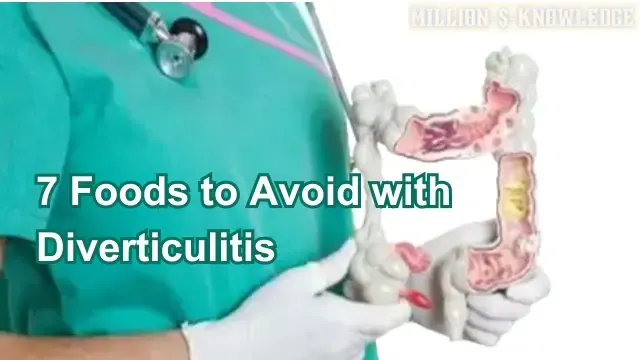7 Foods to Avoid with Diverticulitis
Welcome to our informative discussion on an important topic for individuals dealing with diverticulitis – seven foods to avoid.
Diverticulitis is a condition that affects the digestive system, specifically the colon, causing inflammation and possible complications.
By understanding which foods to avoid, you can better manage your symptoms and potentially prevent further discomfort.
So, let's delve into this essential information to help you make informed dietary choices and improve your overall well-being.
 |
| 7 Foods to Avoid with Diverticulitis |
📖 Table of Contents:
- Introduction
- What is Diverticulitis and why is diet important?
- 7 Foods to avoid with Diverticulitis
- Conclusion
- FAQs
What is Diverticulitis and why is diet important?
Diverticulitis is a condition in which small pouches called diverticula develop in the lining of the colon and become infected or inflamed.
Diet plays a crucial role in managing diverticulitis because certain foods can aggravate the condition or cause flare-ups.
A high-fiber diet helps prevent constipation and promotes regular bowel movements, reducing the pressure on the colon and preventing the formation of diverticula. It also helps to soften stool, making it easier to pass through the colon and decrease the risk of infection or inflammation.
On the other hand, a low-fiber diet can lead to constipation, increasing the strain on the colon and potentially causing diverticula to form or become infected.
Therefore, maintaining a healthy diet, especially one rich in fiber, is essential to managing diverticulitis and preventing complications.
READ ALSO: 5 Foods to Avoid with Hemorrhoids
7 Foods to avoid with Diverticulitis
- Nuts and seeds: These can get stuck in the diverticula, causing irritation and inflammation.
- Popcorn: The hard shell and small, sharp pieces can irritate the diverticula.
- Red meat: High in saturated fats and difficult to digest, it can worsen symptoms.
- Spicy foods: They can irritate the digestive system and cause inflammation.
- Refined grains: White bread, pasta, and rice can lead to constipation, worsening diverticulitis symptoms.
- High-fat dairy products: Full-fat dairy can be difficult to process and lead to discomfort.
- Certain fruits and vegetables: Avoid the peels and seeds of fruits like apples and berries, as well as vegetables like corn and peas, as these can aggravate diverticulitis.
Conclusion
It is important for individuals with diverticulitis to carefully consider their dietary choices to effectively manage their condition.
Although there is no one-size-fits-all approach, it is generally recommended to avoid specific foods that may trigger or worsen symptoms.
By avoiding nuts, seeds, popcorn, red meat, processed foods, spicy dishes, and alcohol, patients can potentially reduce the incidence and severity of diverticulitis flare-ups.
However, it is always advisable to consult a health care professional or registered dietitian to design a personalized diet plan that suits individual needs and helps maintain overall digestive health.
READ MORE:
★ Signs of high cholesterol on face
★ What are the best food for nausea?
★ Does high cholesterol make you tired?
FAQs about Foods to Avoid with Diverticulitis
What triggers diverticulitis?
Diverticulitis is triggered when small pouches in the colon, known as diverticula, become infected or inflamed.
Is milk bad for diverticulitis?
No, milk is not bad for diverticulitis.
Can I eat rice with diverticulitis?
Yes.
Is diverticulitis a serious problem?
Yes, it can be.
What is the best drink for diverticulitis?
Water.
What soups can I eat with diverticulitis?
It is generally recommended to consume low-fibre, easily digestible soups. Some suitable choices include clear broth-based soups, such as chicken or vegetable broth, as well as puree soups without any visible seeds or pieces, such as tomato or butternut squash soups.
What are the worst foods for diverticulitis?
Foods that are low in fiber and can potentially irritate or block diverticula include processed meats, fried foods, refined grains, and sugary snacks.
What are the warning signs of diverticulitis?
Abdominal pain, especially on the lower left side, accompanied by fever, nausea, vomiting and change in bowel habits such as diarrhea or constipation.
What does poop look like with diverticulitis?
Stool with diverticulitis can vary, but it is usually described as having mucus or blood present, and it may appear darker or have a different consistency than normal.





